专题 简单句(陈述句感叹句疑问句祈使句)
简单句(陈述句、感叹句、疑问句、祈使句)精选中考试题
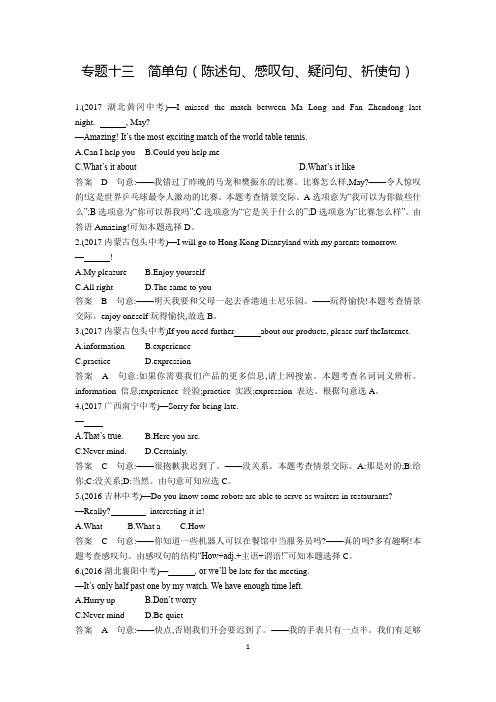
专题十三简单句(陈述句、感叹句、疑问句、祈使句)1.(2017湖北黄冈中考)—I missed the match between Ma Long and Fan Zhendong last night. , May?—Amazing! It’s the most exciting match of the world table tennis.A.Can I help youB.Could you help meC.What’s it aboutD.What’s it like答案D句意:——我错过了昨晚的马龙和樊振东的比赛。
比赛怎么样,May?——令人惊叹的!这是世界乒乓球最令人激动的比赛。
本题考查情景交际。
A选项意为“我可以为你做些什么”;B选项意为“你可以帮我吗”;C选项意为“它是关于什么的”;D选项意为“比赛怎么样”。
由答语Amazing!可知本题选择D。
2.(2017内蒙古包头中考)—I will go to Hong Kong Disneyland with my parents tomorrow.—!A.My pleasureB.Enjoy yourselfC.All rightD.The same to you答案B句意:——明天我要和父母一起去香港迪士尼乐园。
——玩得愉快!本题考查情景交际。
enjoy oneself玩得愉快,故选B。
3.(2017内蒙古包头中考)If you need further about our products, please surf theInternet.rmationB.experienceC.practiceD.expression答案A句意:如果你需要我们产品的更多信息,请上网搜索。
本题考查名词词义辨析。
information 信息;experience 经验;practice 实践;expression 表达。
根据句意选A。
4.(2017广西南宁中考)—Sorry for being late.—A.That’s true.B.Here you are.C.Never mind.D.Certainly.答案C句意:——很抱歉我迟到了。
中考复习课件(专题十二:简单句(陈述句、疑问句、祈使句、感叹句、倒装句)

她很少去游泳,是吗?
(4)陈述部分的主语为指物的不定代词时,问句部分的主语用
it。如:
Something is wrong with the computer, isn't it?
那台电脑有问题了,不是吗?
(5)陈述部分的主语为指人的不定代词时,问句部分的主语用
D. How long
专题12┃ 简单句(陈述句、疑问 句、祈使句、感叹句、倒装句)
( A )2. [2013·温州] —It's Father's Day,________? —Yes. Let's buy a gift for Dad.
A. isn't it
B. doesn't it
C. isn't he
专题12┃ 简单句(陈述句、疑问 句、祈使句、感叹句、倒装句)
┃考点过关 ┃ 基础过关 句型转换 1.Our school is beautiful.(改为感叹句)
___H_o_w___ _b_e_a_u_t_if_u_l our school is! 2.Diana made great success in her research because
—________. He went there on business last week.
A.No, he hasn't
B.Yes, he has
C.No, he has
D.Yes, he hasn't
专题12┃ 简单句(陈述句、疑问 句、祈使句、感叹句、倒装句)
( C )3. Don't make so much noise, Lily, ________?
句法练习100例(陈述句+疑问句+感叹句+祈使句+反义疑问句)
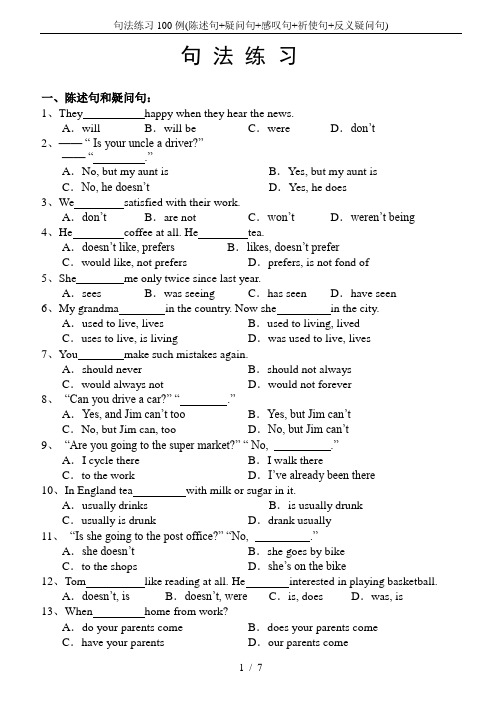
句法练习一、陈述句和疑问句:1、They happy when they hear the news.A.will B.will be C.were D.don’t 2、——“ Is your uncle a driver?”——“.”A.No, but my aunt is B.Yes, but my aunt isC.No, he doesn’t D.Yes, he does3、We satisfied with their work.A.don’t B.are not C.won’t D.weren’t being4、He coffee at all. He tea.A.doesn’t like, prefers B.likes, doesn’t preferC.would like, not prefers D.prefers, is not fond of5、She me only twice since last year.A.sees B.was seeing C.has seen D.have seen6、My grandma in the country. Now she in the city.A.used to live, lives B.used to living, livedC.uses to live, is living D.was used to live, lives7、You make such mistakes again.A.should never B.should not alwaysC.would always not D.would not forever8、“Can you drive a car?” “.”A.Yes, and Jim can’t too B.Yes, but Jim can’tC.No, but Jim can, too D.No, but Jim can’t9、“Are you going to the super market?” “ No, .”A.I cycle there B.I walk thereC.to the work D.I’ve already been there10、In England tea with milk or sugar in it.A.usually drinks B.is usually drunkC.usually is drunk D.drank usually11、“Is she going to the post office?” “No, .”A.she doesn’t B.she goes by bikeC.to the shops D.she’s on the bike12、Tom like reading at all. He interested in playing basketball.A.doesn’t, is B.doesn’t, were C.is, does D.was, is13、When home from work?A.do your parents come B.does your parents comeC.have your parents D.our parents come14、Which of the students the examination?A.not pass B.didn’t pass C.pass D.didn’t passed 15、They trouble lifting the heavy box.A.didn’t have many B.hadn’t a lot ofC.didn’t have much D.ha ven’t a great deal of 16、——“Did you have breakfast this morning?——“.”A.Yes, I had B.Yes, I did C.No, I hadn’t D.No, I didn’t have.17、colour is the cover of the dictionary?A.What B.Which C.How D.Whose18、“does he brush his teeth a day?” “Twice.”A.What time B.How long C.When D.How many times 19、There are many pictures on the wall.do you like best?A.What B.Which oneC.Which of the picture D.Which one picture20、Since when her?A.did you know B.have you knownC.do you know D.you know21、“That ten pound note belongs to me.” “.”A.Yes, it is B.Yes, it belongs C.No it doesn’t D.No, it isn’t 22、“Would you rather wait or come back later?” “.”A.I’d rather come back B.Yes, I’d rather not waitC.No, I’d rather wait D.to come back23、“shoes do you take?” “Size 42.”A.Which number B.What numberC.What size D.What24、“is the weather like today?” “ It’s windy.”A.What B.How C.What kind D.Which25、Would you read my composition and correct the mistakes, ?A.if have B.if any C.if ever D.if not26、is the distance between these two villages?A.How far B.What C.How long D.How much 27、do you go to the cinema? Twice a month.A.How many time B.How muchC.How long D.How often28、How it in English?A.you say B.do you speak C.do you say D.to speak29、is the population of the city?A.How much B.How many C.How D.What30、did she get this information?A.Whom B.Who C.Where D.What31、does your watch cost? Two hundred yuan.A.How many B.What price C.What D.How expensive32、About do you want to know more?A.Whom B.who C.which D.what33、——We haven’t heard from Jane for a long time.——What do you suppose to her.A.was happening B.to happenC.has happened D.having happened34、——Have you heard the news about Jim?——No. What ?A.is it B.it is C.are they D.they are 35、——Would you rather go there by train or by air?——.A.Yes, I would B.No, I wouldn’tC.Yes, by air D.By air36、I go or you go yourself?A.Will…will B.Shall…shall C.Shall…will D.Will…shall 37、——Do you think the question easy or not?——.A.Yes, I do B.No, I don’t C.It is easy D.Yes, it’s easy 38、Shall we stay at home or to the park?A.to go B.going C.go D.will go39、writer is better known in China, Charles Dickens or Mark Twain?A.Whichever B.Whether C.What D.Which40、——was the Nanjing-Changjiang Bridge open to traffic?——It was open to traffic in 1968.A.What B.What time C.How long D.When二、感叹句、祈使句41、from Beijing to London!A.How long way it is B.What a long way it isC.What a long way is it D.How long a way is it42、Oh, John, you gave us!A.How a pleasant surprise B.How pleasant surpriseC.What a pleasant surprise D.What pleasant surprise43、terrible weather we’ve been having these days!A.How a B.What a C.How D.What44、girl she is!A.What bright a B.How a brightC.How bright a D.What a bright45、we have today?A.How fine day B.What fine dayC.How a fine day D.What a fine day46、How flowers are!A.beautiful B.beautifully C.beautiful the D.beautiful that 47、How !A.does time fly B.times fly C.time flies D.flies time 48、What work he does!A.harder B.hard C.hardly D.hardest49、careful our monitor is!A.How a B.How C.What a D.What50、advice he gave us!A.What a B.How good C.What good D.How51、picture it is!A.What wonderful B.How a wonderfulC.What wonderful a D.How wonderful a52、I wish to pay a visit to Hong Kong!A.How do B.What do C.What D.How53、hardworking students they are!A.What B.What a C.What an D.How54、long time it lasted!A.What B.What a C.How D.How a55、down the radio. The baby’s sl eeping in the next room.A.Turning B.To turn C.Turn D.Turned56、Let’s football in the street.A.not to play B.not play C.don’t play D.not playing57、careful when you cross the street.A.Don’t be B.Do be C.Being D.Do58、the child all day long!A.Let, not to cry B.Not let, cryC.Don’t let, to cry D.Don’t let, cry59、afraid of make mistakes!A.Don’t be B.Not to be C.Not being D.Be not60、me again before coming.A.Calling B.To call C.Do calling D.Call三、反意疑问句61、You’d li ke some coffee, ?A.weren’t you B.wouldn’t you C.hadn’t you D.shouldn’t you 62、I don’t think he will come to the meeting, ?A.will he B.won’t he C.do I D.am I63、Harry and his brother promised to work harder, .A.do they B.don’t they C.did they D.didn’t they64、His father knows little about it, he?A.does B.doesn’t C.is he D.isn’t65、We all like reading story books, ?A.do we B.do you C.don’t we D.don’t you66、My sister seldom goes to the theatre she?A.doesn’t B.does C.is D.isn’t67、Your father promised to buy a computer for you, he?A.often, did B.never, didn’t C.already, did D.never, did 68、Be sure to write to us, ?A.will you B.aren’t you C.would you D.can you69、Don’t smoke in the meeting room, you?A.do you B.will you C.would D.can70、It’s fine today. Let’s go fishing, ?A.will we B.shall we C.do we D.don’t we71、Mary has few friend in Japan, she?A.has B.don’t C.doesn’t D.hasn’t72、There is a beautiful lake in this city, ?A.isn’t it B.isn’t there C.is it D.hasn’t it73、There is nothing wrong with my bike, ?A.is it B.isn’t there C.isn’t it D.is there74、He comes late sometimes, ?A.isn’t he B.comes he C.doesn’t he D.is he 75、——You are not a new comer, are you?——. I came here only yesterday.A.No, I am B.Yes, I am C.No, I’m not D.Yes, I’m not.76、She could hardly believe it, ?A.couldn’t she B.could she C.didn’t she D.did she 77、You needn’t go, ?A.can you B.must you C.need you D.may you 78、You must work hard from now on, ?A.can you B.won’t you C.mustn’t you D.needn’t you79、After walking so long a way, you must have been tired, you?A.were B.have C.haven’t D.mustn’t80、He must have left home yesterday, he?A.hasn’t B.didn’t C.mustn’t D.needn’t81、You don’t think I’m going out in such wet weather, ?A.am I B.do you C.don’t you D.do I82、You’d better call in a doctor for your mother, you?A.had B.would C.hadn’t D.wouldn’t83、You need to come earlier, you?A.don’t you B.needn’t C.don’t D.won’t84、You dare not go alone, you?A.don’t B.do C.dare D.daren’t85、He shouldn’t drink so much, he?A.should B.ought C.would D.will86、Nothing can stop us doing that, ?A.can we B.can’t we C.can’t i t D.can it87、I’m late for the meeting, ?A.are n’t I B.aren’t I C.don’t I D.aren’t you88、Nobody but I knows Japanese in my class, ?A.does he B.doesn’t he C.do they D.don’t they89、None of the workers attended the party, ?A.did they B.did he C.didn’t he D.didn’t they90、Everything is right here, ?A.isn’t it B.aren’t they C.are they D.is it91、A lovely day, ?A.is it B.does it C.isn’t it D.doesn’t it92、He isn’t a diligent boy, for it is the second time he has been late,?A.isn’t it B.is he C.has he D.is it93、My sister often needs help with her study, ?A.need she B.needn’t she C.doesn’t she D.does she94、You should have watered the flower earlier, ?A.shouldn’t you B.didn’t you C.don’t you D.haven’t yo u 95、Learning a foreign language well is not easy, ?A.is it B.isn’t it C.does it D.doesn’t it96、What a pretty girl, ?A.isn’t it B.is it C.is she D.isn’t she97、Wang Ping can’t be in the bedroom, ?A.can she B.is she C.can’t he D.i sn’t he98、I wish to visit the Palace Museum next week, ?A.do I B.Shall I C.may I D.can I99、Let us do it for you, ?A.will you B.won’t you C.shall we D.shan’t we100、They have to face the difficulty, they?A.do B.don’t C.haven’t D.w on’t【答案】:1、B2、A3、B4、A5、C6、A7、A 8、B 9、D 10、B 11、C 12、A13、A 14、B 15、C 16、B 17、A 18、D19、B 20、B 21、C 22、A 23、C 24、A25、B 26、B 27、D 28、C 29、D 30、C 31、C 32、A 33、C 34、A 35、D 36、C 37、C 38、C 39、D 40、D 41、B 42、C 43、D 44、D 45、B 46、C 47、C 48、B 49、B 50、C 51、D 52、D 53、A 54、B 55、C 56、B 57、B 58、D 59、A 60、D 61、B 62、A 63、D 64、A 65、C 66、B 67、D 68、A 69、B 70、B 71、A 72、B 73、D 74、C 75、B 76、B 77、C 78、C 79、C 80、B 81、B 82、C 83、A 84、C 85、A 86、D 87、B 88、C 89、A 90、A 91、C 92、A 93、C 94、B 95、B 96、D 97、B 98、C 99、A 100、B。
暑假专题——简单句(陈述句、疑问句、祈使句、感叹句)
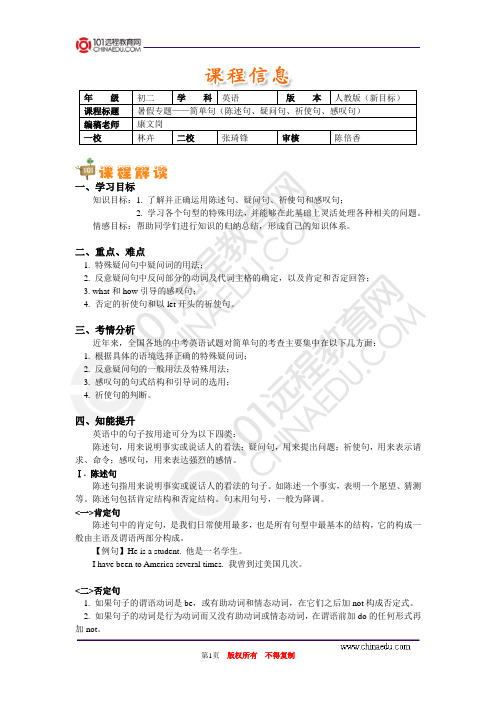
年级初二学科英语版本人教版(新目标)课程标题暑假专题——简单句(陈述句、疑问句、祈使句、感叹句)编稿老师康文岗一校林卉二校张琦锋审核陈倍香一、学习目标知识目标:1. 了解并正确运用陈述句、疑问句、祈使句和感叹句;2. 学习各个句型的特殊用法,并能够在此基础上灵活处理各种相关的问题。
情感目标:帮助同学们进行知识的归纳总结,形成自己的知识体系。
二、重点、难点1. 特殊疑问句中疑问词的用法;2. 反意疑问句中反问部分的动词及代词主格的确定,以及肯定和否定回答;3. what和how引导的感叹句;4. 否定的祈使句和以let开头的祈使句。
三、考情分析近年来,全国各地的中考英语试题对简单句的考查主要集中在以下几方面:1. 根据具体的语境选择正确的特殊疑问词;2. 反意疑问句的一般用法及特殊用法;3. 感叹句的句式结构和引导词的选用;4. 祈使句的判断。
四、知能提升英语中的句子按用途可分为以下四类:陈述句,用来说明事实或说话人的看法;疑问句,用来提出问题;祈使句,用来表示请求、命令;感叹句,用来表达强烈的感情。
Ⅰ. 陈述句陈述句指用来说明事实或说话人的看法的句子。
如陈述一个事实,表明一个愿望、猜测等。
陈述句包括肯定结构和否定结构。
句末用句号,一般为降调。
<一>肯定句陈述句中的肯定句,是我们日常使用最多,也是所有句型中最基本的结构,它的构成一般由主语及谓语两部分构成。
【例句】He is a student. 他是一名学生。
I have been to America several times. 我曾到过美国几次。
<二>否定句1. 如果句子的谓语动词是be,或有助动词和情态动词,在它们之后加not构成否定式。
2. 如果句子的动词是行为动词而又没有助动词或情态动词,在谓语前加do的任何形式再加not。
【例句】He doesn’t go to work by bus. 他不乘公交车去上班。
简单句(陈述句、感叹句、疑问句、祈使句)中考题组
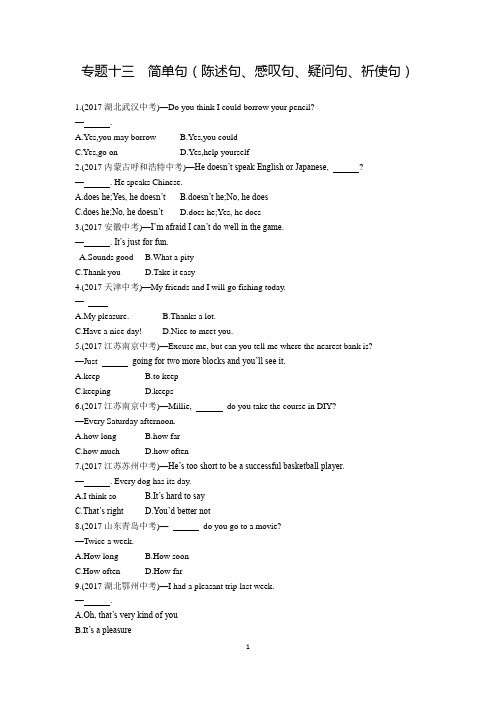
专题十三简单句(陈述句、感叹句、疑问句、祈使句)1.(2017湖北武汉中考)—Do you think I could borrow your pencil?—.A.Yes,you may borrowB.Yes,you couldC.Yes,go onD.Yes,help yourself2.(2017内蒙古呼和浩特中考)—He doesn’t speak English or Japanese, ?—. He speaks Chinese.A.does he;Yes, he doesn’tB.doesn’t he;No, he doesC.does he;No, he doesn’tD.does he;Yes, he does3.(2017安徽中考)—I’m afraid I can’t do well in the game.—. It’s just for fun.A.Sounds goodB.What a pityC.Thank youD.Take it easy4.(2017天津中考)—My friends and I will go fishing today.—A.My pleasure.B.Thanks a lot.C.Have a nice day!D.Nice to meet you.5.(2017江苏南京中考)—Excuse me, but can you tell me where the nearest bank is?—Just going for two more blocks and you’ll see it.A.keepB.to keepC.keepingD.keeps6.(2017江苏南京中考)—Millie, do you take the course in DIY?—Every Saturday afternoon.A.how longB.how farC.how muchD.how often7.(2017江苏苏州中考)—He’s too short to be a successful basketball player.—. Every dog has its day.A.I think soB.It’s hard to sayC.That’s rightD.You’d better not8.(2017山东青岛中考)—do you go to a movie?—Twice a week.A.How longB.How soonC.How oftenD.How far9.(2017湖北鄂州中考)—I had a pleasant trip last week.—.A.Oh, that’s very kind of youB.I t’s a pleasure1C.CongratulationsD.I’m glad to hear that10.(2017北京中考)—did you stop playing?—Because I was tired.A.HowB.WhyC.WhenD.Where11.(2017甘肃武威凉州区中考)—Our classmates are going to Fantawild Adventure(方特欢乐世界) after the exams.—exciting idea!A.WhatB.What anC.How anD.How12.(2017山东潍坊中考)—Shall we go to the amusement park right away or the day after tomorrow?—.Any time will do.A.Excuse meB.Have a good timeC.It’s up to youD.I’m afraid I can’t13.(2017甘肃兰州中考)—How often do you have a meeting one month?—.A.For one weekB.One week agoC.In one weekD.Once a week14.(2017吉林中考)—Jeff, I will take an important exam tomorrow.—A.Good luck!B.Congratulations!C.Good idea!15.(2017云南昆明中考)—?—Twice a week.A.How old are youB.How far is it from your home to schoolC.How do you get to schoolD.How often do you exercise16.(2017吉林长春中考)—The final exam is over. Will you stay at home or visit your grandparents?—. I miss them very much.A.Yes, I willB.I’ll stay at homeC.N o, I won’tD.I’ll visit my grandparents17.(2017吉林长春中考)wonderful The Reader is! Many people enjoy this TV program.A.HowB.How aC.WhatD.What a18.(2017吉林长春中考)for me at the bus station across from the post office. I can find2you easily.A.WaitB.To waitC.WaitingD.Waits19.(2016陕西中考)—Could you tell me it takes to walk to the Disneyland? —About 20 minutes.A.how farB.how longC.how oftenD.how soon20.(2016山东济宁中考)—can you read in English?—About 100 words a minute.A.How farB.How muchC.How fastD.How many21.(2016宁夏中考)—Could you tell me you will come back?—In ten minutes.A.how soonB.how oftenC.how longD.how fast22.(2016福建福州中考)—is the nearest hospital from here?—Er, it’s about ten minutes’ walk.A.How longB.How farC.How often23.(2016湖北襄阳中考)—are the students in your class?—Most of them are only fourteen.A.How longB.How oldC.How manyD.How often24.(2016天津中考)—I tried to pass the driving test, but I failed.—. Good luck to you next time.A.That’s gre atB.It’s interestingC.That’s a pityD.Glad to hear that25.(2016天津中考)—Hi,Diana,how was your summer holiday?—!I enjoyed myself in the sea very much.A.Good ideaB.Wait a minuteC.That’s too badD.Pretty good26.(2016重庆中考)—I’m sorry. I broke your t ea cup.—. I have another one at home.A.It doesn’t matterB.You’d better notC.My pleasureD.It’s too bad27.(2016重庆中考)—Mrs. Black, I’m afraid that I’ll fail the exam.—, dear! Take it easy. I’m sure you’ll pass it.A.Sorry to hear thate onC.All rightD.Good job28.(2016北京中考)—are these bananas?—$3.99.3A.How muchB.How longC.How heavyD.How big29.(2016重庆中考)—You play the piano so well. do you take piano lessons?—I go to piano lessons twice a week.A.How longB.How manyC.How oftenD.How much30.(2015上海中考)important it is for kids to imagine freely!A.WhatB.What aC.What anD.How31.(2015广东广州中考)—will the invitations be sent to our guests?—In three days.A.How oftenB.How soonC.How longD.How far32.(2015四川成都中考)—can we become good learners?—By working hard and asking the teachers for help.A.HowB.WhereC.When33.(2015内蒙古呼和浩特中考)We have to finish the work now,?A.don’t weB.haven’t weC.have weD.do we34.(2015湖南长沙中考)—Jane Zhang is going to hold a concert here in July.—Really?exciting news!A.HowB.What anC.What35.(2015河南中考)kind and helpful to the people around us,and we will make the world a nicer place to live in.A.BeB.BeingC.To beD.Been36.(2015陕西中考)o n the grass,or it will“cry”.A.To walkB.Not to walkC.WalkD.Don’t walk37.(2015上海中考)Please your exam papers once again before handing them in.A.going overB.went overC.go overD.to go over38.(2015上海中考)—father took part in the charity activity in the neighbourhood yesterday?—Peter’s.A.WhoseB.WhatC.WhichD.Who39.(2015江苏连云港中考)—What programme is so attractive?—The guard of honor(仪仗队)of the PLA are taking part in the parade on Red Square. —exciting event!A.How aB.What anC.How anD.What a40.(2015重庆中考)—did you work out the problem in such a short time?—With Mr.Li’s help.A.WhenB.WhereC.HowD.Which4答案精解精析1.D2.C3.D4.C5.A6.D7.B8.C9.D10.B11.B12.C13.D14.A15.D 16.D17.A18.A19.B 20.C21.A22.B23.B24.C25.D26.A27.B28.A 29.C30.D31.B32.A33.A34.C35.A36.D37.C 38.A39.B40.C5。
初中英语简单句、并列句、复合句

拓维培优英语语法专题——简单句、并列句简单句:陈述句、感叹句、疑问句、祈使句一、陈述句陈述句用来陈述一件事情或者表达一种看法,有肯定和否定两种形式,句末通常用句号,读降调。
用句号,读降调。
1、肯定形式:主语+谓语+其他其他The boy often helps others. 2、否定形式:、否定形式:(1)be的否定式:其他的否定式: be用作系动词时:主语+be+not+表语+其他She is not a teacher. be用作助动词时:主语+be+not+动词的现在分词或过去动词的现在分词或过去分词+其他其他 Jim isn’t playing football. (2)助动词、情态动词的否定助动词、情态动词的否定(3)除not外,其他否定词也可构成否定句:no、never、little、few、no one、nobody nothing、neither of....、seldom、too...to 二、感叹句感叹句是用来表达人的特殊情感的句子。
1、what引导的感叹句引导的感叹句(1)What+a/an+形容词+可数名词单数形式+主语+谓语!谓语! What a beautiful girl she is! (2)What+形容词+可数名词复数形式+主语+谓语!谓语! What important jobs they have done! (3)What+形容词+不可数名词+主语+谓语!谓语! What sweet water it is! 2、how引导的感叹句引导的感叹句(1)How+形容词或副词+主语+谓语!谓语! How interesting the dog is! (2)How+形容词+a/an+可数名词单数形式+主语+谓语!谓语! How useful a subject it is! (3)How+主语+谓语!谓语! How time flies! 3、一些特殊形式、一些特殊形式(1)在陈述句、祈使句或疑问句句尾加感叹号变成感叹句He runs so fast! (2)用一个词或词组表达强烈感情的句子用一个词或词组表达强烈感情的句子Wonderful! Look out! Great! (3)以there、here等副词开头的感叹句等副词开头的感叹句There she is! There goes the bell! 三、疑问句用以提问的句子较疑问句,句末用问号。
河南仁爱版中考英语语法过关练习 13_专题十三 简单句(陈述句、感叹句、疑问句、祈使句)
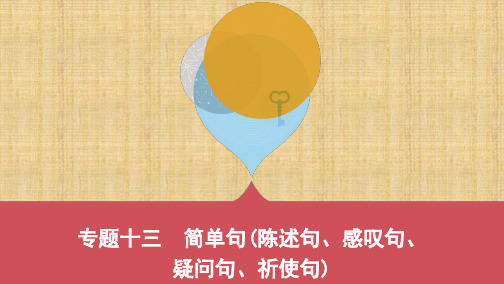
—Do you like playing football?你喜欢踢足球吗? —Yes,I do.是的,我喜欢。/—No,I don't.不,我不喜欢。 注意:一般疑问句通常是怎么问怎么答,即用什么词提问,就用什么词回答,但 在下列情况中例外。
1.用其他词语代替yes或no来回答,从而使语气变得客气、委婉。如: —Can you come and go to the park with me? ——你能来和我一起去公园吗? —I'm afraid not.I have a lot of work to do. ——恐怕不行,我有很多工作要做。
(4)no one/nobody 没有人。如: No one/Nobody is interested in the book. 没有人对这本书感兴趣。 (5)nothing什么也没有。如: There is nothing wrong with you.你什么问题也没有。 (6)neither of...没有一个(用于表示两者都不);none of...一点儿也没有(与不可 数名词连用),一个也没有(用来全面否定三个或三个以上的人或物)。如: Neither of them has ever been to Beijing. 他们两个都没有去过北京。
用yes或no来回答。反意疑问部分的主语要用代词,并与陈述部分的主语一 致,谓语动词在人称、数和时态上也要与陈述部分一致。 反意疑问句的重点是反意疑问部分的主语和谓语这两部分,因此对此知识点 的命题重点就是反意疑问部分主语和谓语的确定,这是此考点命题的基本指 导思想。不过,由于对反意疑问句作出回答的特殊性及易错性,考查反意疑问 句的回答方式也常会出现在中考英语试卷中,而且由于对反意疑问句作回答 与语境或情景联系较紧,所以此考查方式越来越受到命题人的青睐。
小学语文必会基础知识(陈述句、疑问句、祈使句、感叹句)

小学语文必会基础知识--句子
1、陈述句:用于告诉别人一件事或一个道理,表示陈述语气的句子,一般语调平和,句尾一般用句号。
例:(1)小明的好朋友是学生。
(2)明天我们去秋游。
(3)夜空中满是闪闪的星星。
2、疑问句:用于提出问题的句子,句尾语调上升,常有疑问词“呢、吗、呀、么”等等句尾用问号。
例:(1)这本书是你的吗?(2)你吃过午饭了吗?(3)他在做什么呢?
3、祈使句:表示命令、请求、希望或者劝阻的句子,根据语句语调可以用叹号、也可用句号。
例:(1)不许随便乱走!(2)请把那本书给我。
4、感叹句:用于抒发感情、表示感叹的句子,句尾用叹号。
例:(1)春天的景色真美呀!(2)种子的力量竟然有这么大!。
河南人教版中考英语语法过关练习 13_专题十三 简单句(陈述句、感叹句、疑问句、祈使句)

1.be的否定式 (1)be用作系动词时,陈述句结构为:主语+be+not+表语+其他。如: She is not a teacher.她不是一个老师。 (2)be用作助动词,用于be doing/be going to do/be done等时态或被动语态中,陈 述句结构为:主语+be+not+动词的现在分词或过去分词+其他。如: Jim isn't playing football.吉姆没在踢足球。 The sweater isn't made of wool.这件毛衣不是羊毛做的。 2.助动词、情态动词的否定式 Man can't live without water.没有水人类不能生存。
(7)seldom 很少,hardly 几乎不。如: I seldom go to hospital.我很少去医院。 I can hardly say a word.我几乎不能说一句话。 (8)too...to...太……以至于不能……。如: He comes too late to catch the bus. 他来得太晚了以至于不能赶上公共汽车了。 疑问句 用以提问的句子叫疑问句,句末用问号。疑问句分为一般疑问句、特殊疑问 句、选择疑问句和反意疑问句。
名师精讲 陈述句 陈述句用来陈述一件事或表达一种看法,有肯定和否定两种形式,句末通常用 句号,读降调。 一、陈述句的肯定式 结构:主语+谓语+其他。如: That boy often helps others.那个男孩经常帮助别人。 I went to the cinema yeste you work out the problem in such a short time? —With Mr.Li's help. A.When B.Where C.How D.Which 答案 C 句意:——你是如何在这么短的时间内解答出这道题的?——在李 老师的帮助下解答出来的。考查特殊疑问词。when什么时候;where在哪里; how如何;which哪一个。根据答语可知选C。
英语复习课件(人教):简单句陈述句、疑问句、反意疑问句、感叹句、祈使句、倒装句(共20张PPT)

反意疑问句的构成: 陈述句+附加疑问句?附加疑问句的 否定式必须缩写。
1.陈述句部分与附加疑问句部分意思相反: 前肯后否、 前否后肯。
Mary is a teacher, ___is_n_'_t_s_h_e_? He didn't tell you the story, ___d_id__h_e___? 2.反意疑问句的基本对应形式如下: (1)be动词对应be动词。如: She is a policewoman, __i_sn__'t_s_h_e__? (2)情态动词对应情态动词。如: He can drive the car, __c_a_n_'_t _h_e__?
语法互动(十二)┃简单句(陈述句、疑问句、 反意疑问句、感叹句、祈使句、倒装句)
考点、疑问句、 反意疑问句、感叹句、祈使句、倒装句)
W__h__a_t ___ a beautiful flower it is! 这是一朵多么漂亮的花啊! _W__h__at___ good news it is! 多好的消息啊! _H__o_w____ fast Jim runs! 吉姆跑得多么快啊!
语法互动(十二)┃简单句(陈述句、疑问句、 反意疑问句、感叹句、祈使句、倒装句)
考点一 陈述句 陈述句是用于陈述一个事实或表达说话人的看法的句子。
陈述句主要分为肯定句和否定句。 1.陈述句的肯定句式主要有五种基本句型 (1)“主语+系动词+表语” I am honored. 我很荣幸。 (2)“主语+不及物动词” The students work very hard. 学生们学习很努力。 (3)“主语+及物动词+宾语” I teach English. 我教英语。
语法互动(十二) 简单句(陈述句、 疑问句、反意疑问句、感叹句、
13_专题十三 简单句(陈述句、感叹句、疑问句、祈使句)

考点突破
栏目索引
1.用其他词语代替yes或no来回答,从而使语气变得客气、委婉。如:
—Can you come and go to the park with me? ——你能来和我一起去公园吗? —I'm afraid not.I have a lot of work to do. ——恐怕不行,我有很多工作要做。
A.Will you
C.What about
B.How about
D.Why don't
答案 A 句意:——你将找一位笔友练习写作吗?——是的,我会的。由句
式结构及被选项可推断出答案为A项。
考点突破
栏目索引
2.— C
did you work out the problem in such a short time?
教室里几乎没有学生。
考点突破
栏目索引
(4)no one/nobody 没有人。如:
No one/Nobody is interested in the book. 没有人对这本书感兴趣。 (5)nothing什么也没有。如: There is nothing wrong with you.你什么问题也没有。 (6)neither of...没有一个(用于表示两者都不);none of...一点儿也没有(与不可 数名词连用),一个也没有(用来全面否定三个或三个以上的人或物)。如: Neither of them has ever been to Beijing.
—With Mr.Li's help. A.When B.Where C.How D.Which
答案 C 句意:——你是如何在这么短的时间内解答出这道题的?——在李 老师的帮助下解答出来的。考查特殊疑问词。when什么时候;where在哪里; how如何;which哪一个。根据答语可知选C。
陈述句、反问句、感叹句、祈使句专题

陈述句、反问句、感叹句、祈使句专题知识点讲解句子就是由词或词组构成的,能够表达一个完整的意思,其组成形式是“谁(什么、哪里)”加“做什么(是什么、怎么样)”。
例如:在明亮的教室里认真地学习知识。
句子类型:陈述句、疑问句、祈使句、感叹句。
一、句子类型分析1.陈述句陈述句是陈述一个事实或者说话人的看法。
它包括肯定句和否定句两种句式。
陈述句在书写时句末有句号,而在朗读时则用降调。
示例1:我游览了长城。
(表示肯定的语气)示例2:他没有参加小组会。
(表示否定的语气)示例3:“乡亲们没有不夸雨来聪明的。
(双重否定表示肯定的语气)2.反问句反问句就是用疑问的句式,表达肯定的观点。
反问句表面看来是疑问的形式,但实际上表达的是肯定的意思,答案就在问句之中。
反问的形式比一般的陈述句语气更强,更能引起人们的思考。
常反问句是陈述句的改版,是为了强调语气。
如:你怎么可以这样呢?这个反问句改为陈述句就是:你不能这样。
相比之下,前一个句子语气就强烈多了。
一个完整的反问句,一般会有这三个特征:(1)反问词,如:难道、怎么、这么……(2)语气词如:呢吗……(3)句末加上问号(?)。
示例1:看到那数不尽的青松白桦,谁能不向四面八方望一望呢?示例2:居里夫人只要在专利书上签个字,所有的困难不是都可以解决了吗?3.感叹句感叹句:带有快乐、惊讶、厌恶等浓厚感情的句子,句末用感叹号。
示例1:我们的生活多幸福啊!——表示快乐的语气示例2:这么做太不像话了!表示谴责的语气。
——表示谴责的语气4.祈使句祈使句:用来要求听话人做某件事情的句子。
如命令、请求、禁止或劝阻语气的句子都是祈使句。
祈使句常常是要求别人做什么或不做什么,句末用句号或叹号。
示例1:立正!出发!把他带走!——表示命令的祈使句言词肯定,坚定不移,句子的前半部分常常被省略。
示例2:“老师,让我去吧!”——表示请求的祈使句语气比较缓和。
示例3:不要攀折花木!油库重地,请勿吸烟!——表示禁止的祈使句语气比较强硬,大多省去句子的前半部分。
英语语法简单句陈述句、疑问句、反意疑问句、感叹句、祈使句、倒装句课件PPT

语法互动(十二)┃简单句
2.反意疑问句的基本对应形式如下: (1)be动词对应be动词。 She is a policewoman, __is_n_'_t_s_h_e__? (2)情态动词对应情态动词。 He can drive the car, __c_a_n_'t_h__e__? (3)行为动词对应助动词的相应形式。这种助动词主要指帮助 构成疑问句或否定句的do, does, did以及它们的否定形式。 He slept for 9 hours yesterday, _d__id_n_'_t_h_e__? He didn't go to the park, __d_i_d_h__e___?
I don't think the answer is right, ____is____ ____it____? 3. 让我们去购物,好吗?
Let's go shopping, ___sh_a_l_l__ ____w_e___? 4.这是多么令人兴奋的消息啊!
__H__o_w___ _e_x_c_i_ti_n_g_ the news is!
On the right of my school is my house. 学校的右面是我的家。
语法互动(十二)┃简单句
考点过关
根据汉语意思完成句子 1.你在这里工作多长时间了?
__H__o_w___ ___l_o_n_g__ have you worked here? 2.我认为这个答案不正确,是吗?
初中英语 语法
课件PPT
语法互动(十二) 简单句 (陈述句、疑问句、反意疑问句、
感叹句、祈使句、倒装句)
语法互动(十二)┃简单句
中考要求
简单句(陈述句、感叹句、疑问句、祈使句)

Jim isn't playing football.吉姆没有在踢足球。
常考点清单
栏目索引
2.助动词、情态动词的否定式 The boy doesn't do housework at home. 这个男孩在家不做家务。 3.除not外,其他否定词也可以构成否定句 (1)用no表示,no=not any/a。 He has no sister.=He doesn't have any sisters.
栏目索引
考点二
特殊疑问句也经常出现在中考里,考查学生
对句意的掌握和理解
例1 — —Ten dollars. A.How many C.How long B.How much D.How often did you pay for the food?
解析 考查特殊疑问词组的用法。句意:——你买这些食物付了多少
他没有姐妹。
(2)never绝不,从不。 I have never seen such a man. 我从没见过这样的一个男人。 (3)little,few几乎没有。 There are few students in the classroom. 教室里几乎没有学生。
常考点清单
栏目索引
(4)no one/nobody 没有人。
钱?——十美元。提问价格用how much。
答案 B
考点示例
栏目索引
例2 —
bowl of mutton soup would you like?
—A big bowl,please.
A.What size
C.How much
B.What big
D.How size
解析 答句句意:请来一大碗。由此可知是对碗的型号进行提问的。在 英语中What size是针对型号进行提问的,故选A。 答案 A
专题——简单句(陈述句、疑问句、祈使句、感叹句)同步练习

新目标初二英语人教版反意疑问句一、单项选择1.H e r s i s t e r h a d a b a d c o l d,s h e?A.w a s n’tB.d o e s n’tC.h a d n’tD.d i d n’t2.—I t’s t i m e t o g o t o b e d.Y o u h a v e t o g e t u p e a r l y t o m o r r o w,?—Y e s,w e a r e g o i n g h i k i n g t o m o r r o w.A.c a n’t y o uB.d o n’t y o uC.a r e n’t y o uD.h a v e n’t y o u3.S h e h a s f e w f r i e n d s i n t h e n e w c i t y,?A.h a s s h eB.i s s h eC.d o e s n’t s h eD.d oe s s h e4.H e’s a n A u s t r a l i a n,?A.h a s n’t h eB.i s n’t h eC.d o e s n’t h eD.w a s n’t h e5.T h e r e w i l l b e a v o l l e y b a l l m a t c h i n o u r s c h o o l,?A.b e t h e r eB.i s t h e r eC.w i l l t h e r eD.w o n’t t h e r e6.—L i l y d i d n’t c o m e t o s c h o o l,d i d s h e?—.S h e w a s i l l i n b e d.A.N o,s h e d i dB.Y e s,s h e d i dC.N o,s h e d i d n’tD.Y e s, s h e d i d n’t7.T o m h a r d l y h a d t i m e f o r c o n c e r t s a t t h a t t i m e,?A.w a s n’t h eB.w a s h eC.d i d n’t h eD.d i d h e8.—M r s S m i t h a t e n o t h i n g t h i s m o r n i n g,?—N o.S h e g o t u p t o o l a t e.A.d i d n’t s h eB.d i d s h eC.w a s s h eD.w a s n’t s h e9.J a n e h a s t o s t a y a t h o m e a n d d o h e r h o m e w o r k,?A.i s s h eB.h a s n’t s h eC.d o e s s h eD.d oe s n’t s h e10.J a c k i s t o o y o u n g t o l o o k a f t e r h i m s e l f,?A.i s n’t h eB.i s J a c kC.a r e n’t t h e yD.i s h e11.D o n’t e a t t o o m u c h,?A.w i l l y o uB.d o n’t y o uC.d o y o uD.c a n y o u12.—Y o u d i d n’t c h a n g e y o u r m i n d,d i d y o u?—______.A.N o,I d i d n’tB.Y e s,d i d IC.N o,I d i dD.Y e s, I d i d n’t13.L e t’s g o t o p l a y b a s k e t b a l l,?A.w i l l w eB.d o w eC.d o n’t w eD.s h a l l w e14.H e h a s n e v e r r i d d e n a h o r s e b e f o r e,?A.d o e s h eB.h a s h eC.h a s n’t h eD.d o e s n’th e15.T h e r e i s l i t t l e o r a n g e i n t h e g l a s s,?A.i s n’t t h e r eB.i s n’t i tC.i s i tD.i s t h e r e二、完成下列反意疑问句1.Y o u r f a t h e r i s a w o r k e r,?2.M a r y i s g o i n g t o s t u d y C h i n e s e,?3.T h e y w o n’t h a v e a g o o d t i m e,?4.T o m a n d M i k e a r e w a t c h i n g T V,?5.S h e h a d a r e s t a m o m e n t a g o,?6.L e t’s g o t o s c h o o l,?7.L i s t e n t o m e,?8.T h e r e’s l i t t l e w a t e r i n t h e r i v e r,?9.H e h a s n e v e r b e e n t o J a p a n,?10.K a t e m a d e f e w m i s t a k e s i n t h e e x a m,?感叹句一、单项选择1.W h a t a f u n n y p e r s o n!W e a l l l i k e t a l k i n g w i t h h i m.A.i s i tB.i s h eC.i t i sD.h e i s2.n a t u r a l t h i n g s t h e y a r e!A.H o wB.W h a tC.W h i c hD.W h e r e3.w e h a d m a k i n g s n o w m e n l a s t S u n d a y!A.W h a t a g r e a t f u nB.W h a t g r e a t f u nC.H o w a g r e a t f u nD.H o w g r e a t f u n4.t h e s i t t i n g r o o m l o o k s.A.W h a t b e a u t i f u lB.H o w b e a u t i f u l l yC.W h a t b e a u t i f u l l yD.H o w b e a u t i f u l5.i t i s b l o w i n g!A.W h a t s t r o n gB.H o w s t r o n gC.H o w s t r o n g l yD.W h a t s t r o n g l y6.w e l l y o u s i n g b u t b a d l y h e d a n c e s!A.H o w,h o wB.W h a t,w h a tC.H o w,w h a tD.W h a t,h o w7.d e l i c i o u s t h e s o u p i s!I’d l i k e s o m e m o r e.A.H o wB.H o w a nC.W h a tD.W h a t a n8.f o o l i s h t h e y w e r e!T h e y b e l i e v e d w h a t t h e m a n s a i d.A.H o wB.H o w a nC.W h a tD.W h a t a n9.d i f f i c u l t q u e s t i o n s t h e y a r e!I c a n’t a n s w e r t h e m.A.H o wB.H o w a nC.W h a tD.W h a t a n10.l o v e l y w e a t h e r w e a r e h a v i n g t h e s e d a y s!A.H o wB.H o w a nC.W h a tD.W h a t a n二、改为感叹句1.T h e b o y s w a m v e r y f a s t.t h e b o y s w a m!2.T h e s c h o o l t r i p i s v e r y e x c i t i n g.t h e s c h o o l t r i p i s!3.H e i L o n g j i a n g l o o k s v e r y b e a u t i f u l i n w i n t e r.H e i L o n g j i a n g l o o k s i n w i n t e r!4.I t i s a v e r y u s e f u l d i c t i o n a r y.d i c t i o n a r y i t i s!d i c t i o n a r y i s!5.T h e s t u d e n t s a r e l i s t e n i n g v e r y c a r e f u l l y.t h e s t u d e n t s a r e l i s t e n i n g!祈使句一、单项选择1.m o r e,a n d y o u’l l i m p r o v e y o u r s p o k e n E n g l i s h.A.S p e a kB.S p e a k sC.S p e a k i n gD.T o s p e a k2.B o y s a n d g i r l s,u p y o u r h a n d s i f y o u w a n t t o t a k e p a r t i n t h e s u m m e r c a m p.A.p u t t i n gB.t o p u tC.p u tD.p u t t e d3.“e x e r c i s e e v e r y d a y,m y c h i l d.I t’s g o o d f o r y o u rh e a l t h.”F a t h e r s a i d.A.T a k i n gB.T o t a k eC.T a k eD.T a k e s4.t h i s k i n d o f p e a c h,a n d y o u w i l l l i k e i t.A.T o t r yB.T r y i n gC.T r yD.T r i e d5.S s h!t a l k l o u d l y.T h e b a b y i s s l e e p i n g r i g h t n o w.A.D oB.D o e sC.D o n’tD.D o e s n’t6.H e r d o c t o r s a i d,“w o r k s o h a r d.”A.S t o pB.D o n’tC.C a n’tD.N o﹡7.w h e n y o u c r o s s t h e r o a d.A.D o c a r eB.C a r eC.D o b e c a r e f u lD.T o b ec a r e f u l8.h i m t h e s e c r e t,w i l l y o u?A.D o n’t t e l lB.N o t t o t e l lC.N o t t e l l i n gD. N o t e l l i n g9.y o u r c h i l d.W e’l l l o o k a f t e r h i m.A.N o t t o w o r r y a b o u tB.D o n’t w o r r y a b o u tC.N o t w o r r y f o rD.D o n’t w o r r y w i t h10.S i n d y,t o b e h e r e a t8o’c l o c k.A.i s s u r eB.i s s u r e t h a tC.w i l l b e s u r eD.b e s u r e二、用括号内所给动词的适当形式填空。
- 1、下载文档前请自行甄别文档内容的完整性,平台不提供额外的编辑、内容补充、找答案等附加服务。
- 2、"仅部分预览"的文档,不可在线预览部分如存在完整性等问题,可反馈申请退款(可完整预览的文档不适用该条件!)。
- 3、如文档侵犯您的权益,请联系客服反馈,我们会尽快为您处理(人工客服工作时间:9:00-18:30)。
专题十四简单句(陈述句,感叹句,疑问句,祈使句)一.陈述句陈述句用来陈述一句事或表达一种看法,有肯定和否定两种形式,句末通常用句号,读降调。
一.陈述句的肯定形式结构:主语+谓语+其他。
如:That boy often helps others. 那个男孩经常帮助别人。
I went to the cinema yesterday. 昨天我去看电影了。
二.陈述句的否定形式1.be的否定式(1)be用作系动词时,结构为:主语+be+not+表语+其他。
如:She is not a teacher. 她不是一个老师。
(2)be用作助动词,用于be doing/be going to/be done等时态或被动语态中,结构为:主语+be+not+动词的现在分词或过去分词+其他。
如:Jim isn’t playing football. 吉姆不在踢足球。
The sweater isn’t made of wool. 这件毛衣不是羊毛做的。
2.助动词,情态动词的否定式Man can’t live without water. 没有水人类不能生存。
3.除not外,其他否定词也可以构成否定句(1)用no表示,no=not any/a。
如:He has no sisters.=He doesn’t have any sisters. 他没有姐妹。
(2)never绝不,从来不。
如:I have never seen such a man. 我从没见过这样的人。
(3)little, few 几乎没有。
如:There are few students in the classroom.教室里几乎没有学生。
(4)no one/nobody 没有人。
如:No one/Nobody is interested in the book.没有人对这本书感兴趣。
(5)Nothing什么也没有。
如:There is nothing wrong with you. 你没有什么问题。
(6)neither of...没有什么人(常用于两者都不);none of...没有任何人,什么都没有(用于三者及以上都不)。
如:Neither of them has ever been to Beijing.他们两个都没有去过北京。
(7)seldom很少,hardly 几乎不。
如:I seldom go to hospital. 我很少去医院。
I can hardly say a word. 我几乎不能说一句话。
(8)too...to... 太....以至于不能..... 如:He is too late to catch the bus.他来得太迟赶不上公共汽车了。
二.感叹句感叹句是用来表达人的特殊情感的句子,可以表达人的喜,怒,哀,乐等感情色彩。
感叹句可以是一个单词,一个不定式,一个由短语构成的独立句,也可以是由what或how引导的句子,句末常用“!”。
一、what引导的感叹句1.What+a/an+形容词+可数名词的单数形式+主语+谓语!如:What a beautiful girl she is! 她是一个多么漂亮的女孩呀!2.What+形容词+可数名词的复数形式+主语+谓语!如:What important jobs they have done!他们做了多么重要的工作呀!3.What+形容词+不可数名词+主语+谓语!如:What sweet water it is!多甜的水呀!二.How引导的感叹句1.How+形容词或副词+主语+谓语!如:How interesting the dog is!多么有趣的狗呀!2.How+形容词+a/an+可数名词的单数形式+主语+谓语!如:How useful a subject they are learning!他们正在学的科目多么有用呀!3.How+主语+谓语!如:How time flies!时间过得真快呀!三.一些特殊形式1.在陈述句,祈使句或疑问句句尾加感叹号变成感叹句,表示某种强烈的感情。
如:He runs so fast! 他跑得真快呀!Do read it carefully!一定要仔细阅读!2.用一个词或词组表达强烈感情的句子也是感叹句。
如:Wonderful! 好极了!Look out! 小心!Great! 太棒了!3.以there, here等副词开头的感叹句。
如:There she is! 她在那儿!There goes the bell! 铃响了!四.如何判断用what还是用how来引导感叹句方法一。
凡是有a,an开头的,多用what;方法二:凡是形容词直接加名词的,多用what;方法三:其他一般用how。
三.疑问句用以提问的句子叫疑问句,句末用问号。
疑问句分为一般疑问句,特殊疑问句,选择疑问句和反意疑问句。
一.一般疑问句一般疑问句表示询问事物或某种情况是否属实,需要对方给予肯定(yes)或否定(no)回答,读时用升调,它的基本结构为:①be+主语+其他(?);②助动词(或情态动词)+主语+谓语(动词原形)+其他(?)。
使用一般疑问句时应特别注意问句与答句在人称,数和时态上的一致。
对一般疑问句作肯定回答时,通常是:Yes, 主语+be/助动词/情态动词;作否定回答时,通常是:No,主语+be/助动词/情态动词+not, not一般要与前面的词语构成缩略形式。
如:-Are you a doctor?你是医生吗?-Yes, I am.是的,我是。
-No,I’m not.不,我不是。
-Do you like playing football?你喜欢踢足球吗?-Yes, I do.是的,我喜欢。
-No, I don’t.不,我不喜欢。
注意:一般疑问句通常是怎么问,怎么答,即用什么词提问,就用什么词回答,但有下列情况时例外。
1.用其他词语代替yes或no来回答,从而使语气变得客气,委婉。
如:-Can you come and go to the park with me?你能与我一起去公园吗?-I’m afraid not, I have a lot of work to do.恐怕不行,我还有很多工作要做。
2.否定的一般疑问句通常是以be动词,情态动词或助动词与not的缩略形式开头,往往表示惊讶,赞叹,怀疑等语气。
如:-Don’t you hear of that?(表示惊讶)你没有听说过那件事吗?-Yes, I do. 不,我听说过。
-No,I don’t.是的,我没有听说过。
对否定的一般疑问句作简略回答时也用yes或no,但其汉语翻译与其原意正好相反。
二.特殊疑问句用特殊疑问词引导的疑问句叫特殊疑问句。
回答时不能使用yes或no,读降调。
疑问词包括疑问代词,疑问副词和疑问词组。
1.疑问代词:可以对主语,表语,宾语,定语提问,有what(对“物”提问),who(对“人”提问),which(哪一个),whose(谁的),whom(宾格“谁”)。
如:-Who is your teacher? 谁是你的老师-Miss Gao is my teacher. 高老师是我的老师、。
2.疑问副词:用于对状语提问,有when(何时),where(何地),why(为什么)和how(怎么样)等。
如:-When did you come here? 你是什么时候来到这儿的?-In 2005.在2005年。
3.疑问词组:how soon, how long, how far, how often等How soon多久;how long多长时间;how far多远;how often多久一次。
如:-How soon will the concert begin?再过多久音乐会就开始了?-In twenty minutes.再过二十分钟。
-How long have you lived here?你住在这多长时间了?-For five years. 五年了。
-How often do you have an English party?你们多久举行一次英语聚会?-Once a month.一个月一次。
-How far do you live from your school?你住的地方离学校有多远?-About ten minutes’ walk.步行大约十分钟。
4.特殊否定疑问句一般有劝告,建议,责备等意味。
如:Why don’t you go to the zoo?=Why not go to the zoo?为什么不去动物园呢?三.选择疑问句提出两种或两种以上的情况,要求对方选择一种情况回答的问句叫选择疑问句。
选择疑问句中的两种或两种以上情况的用or连接,回答时不能使用yes或no,而要用一个完整的句子或其省略形式。
语调一般是前升后降。
选择疑问句可以分为一般选择疑问句和特殊疑问句两种。
1.一般选择疑问句:一般疑问句+or+被选择部分?如:-Do you like apples or pears?你喜欢苹果还是梨?-I like pears.我喜欢梨。
2.特殊选择疑问句:特殊疑问句+A or B?如:-Which would you like better, tea or coffee?-I like coffee.-你比较喜欢哪种,茶还是咖啡?-我喜欢咖啡。
四,反意疑问句反意疑问句是附在陈述句之后,对陈述句所说的事实或观点提出疑问的句子。
反意疑问句部分要与前面的陈述句用逗号隔开,句末用问号。
如果陈述部分是肯定结构,反意疑问部分就用否定结构,反之亦然。
此问句可用yes或no来回答。
反意疑问部分的主语要用代词,并与前句主语一致,谓语动词在人称,数和时态上也要与前句一致。
反意疑问句的重点是反意疑问句的主语和谓语这两部分,因此对此知识点的命题重点就是反意疑问句部分主语和谓语的确定,这是此考点命题的基本指导思想。
不过,由于对反意疑问句作出回答的特殊性及易错性,考查反意疑问句的回答方式也常会出现在中考英语试卷中,而且由于对反意疑问句作回答与语境或情境练习教紧,所以此考查方式越来越受到命题人的青睐。
10反意疑问部分主语及谓语的确定反意疑问部分主语与谓语的确定应以陈述部分的主语和谓语为依据,尤其要注意一些特殊的情况,同时,简略问句部分的主语一般应用人称代词,而动词若为否定形式则一般应用所略形式。
(1)陈述部分含有never,few,little,nothing,nobody,no,hardly,none,too...to...等表示否定意义的词时,其反意疑问句应用肯定形式。
如:There are few people in the room, are there?房间里几乎没有人,是吗?(2)陈述句部分是“there be”结构时,反意疑问部分用“be there”。
